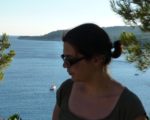Prénom
Charlotte
Titre
MCF
Laboratoire
CEARC
E-mail professionnel
charlotte.da-cunha@uvsq.fr
Page personnelle
Site web du laboratoire
Discipline(s)
Aménagement de l'espace, urbanisme
Axe de recherche MSH Paris-Saclay
Axe 2 – Environnement et Santé
Objets de recherche
My academic areas of interest are multidisciplinary, a reflection of my belief in the importance of interdisciplinarity as a necessary collaborative practice.
My scientific activity is centered on adaptation planning through the implementation of different practices. I work on facilitating a transdisciplinary dynamic through the co-construction of knowledge and governance processes, often based on prospective methods, and approaches that link art and science.
Another area of expertise is the evaluation of adaptation planning by cities, the facilitation of the monitoring, comparison, and transfer of knowledge on local climate adaptation planning across national and institutional borders.
Both research axes are interconnected since they participate in the study of the vulnerability of territories and their capacity for adaptation, and thus contribute to the study of their ability to make the necessary transitions.
My scientific activity is centered on adaptation planning through the implementation of different practices. I work on facilitating a transdisciplinary dynamic through the co-construction of knowledge and governance processes, often based on prospective methods, and approaches that link art and science.
Another area of expertise is the evaluation of adaptation planning by cities, the facilitation of the monitoring, comparison, and transfer of knowledge on local climate adaptation planning across national and institutional borders.
Both research axes are interconnected since they participate in the study of the vulnerability of territories and their capacity for adaptation, and thus contribute to the study of their ability to make the necessary transitions.
Méthodes de recherche
In my research, I mobilize different tools and methods drawn from the social sciences such as participatory methods and practices, prospective methods as well as qualitative research tools and software (semi-structured and open interviews, qualitative analysis software Atlas.Ti, etc).

